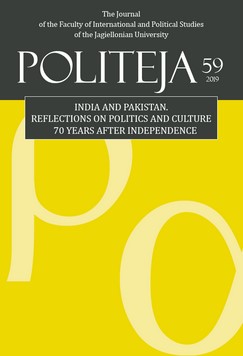India -Pakistan Relations in the Prism of ‘Realist School’ of International Relations
India -Pakistan Relations in the Prism of ‘Realist School’ of International Relations
Author(s): Muhammad Shakeel Ahmad, Fahmeda NaheedSubject(s): Government/Political systems, International relations/trade, Military policy, Political behavior, Geopolitics, Peace and Conflict Studies
Published by: KSIĘGARNIA AKADEMICKA Sp. z o.o.
Keywords: India-Pakistan relationship; ‘realist school of international relations';
Summary/Abstract: The India-Pakistan relationship is shaped by internal and external variables – which form very complex interactions between the two. Externally, both countries are influenced by multiple factors which shape their foreign policies – the geopolitics of South Asia is the major one. However, another important factor in the relationship between the two nations and a source of great tension between the two of them is the persistence influence of the ‘realist school’. This school of thought, holds that nations are rivals and will only seek their own interests at the costs of those of their neighbors. This theory of international relations holds that countries such as India and Pakistan need to compete with each other, especially militarily. This paper will focus on the geopolitical factors which shape India-Pakistan relations in contemporary times – how the geostrategic culture is shaping the relationship of both South Asian neighbors in bringing more distrust, and an antagonized sense of insecurity and mistrust. This article will analyze the geopolitical settings and related factors – bilateral nuisance such as Kashmir, wars and other border disputes; regional factors such as China, Afghanistan – and geopolitical interests of both nations. This research can lead to a better understanding of the strategic culture of the region which greatly influences the relationship between India and Pakistan. This research examines the negative impact of the ‘realist school’ on the relationship between Pakistan and India and indicates that only a change in the political culture of both nations can lead to peaceful co-existence.
Journal: Politeja - Pismo Wydziału Studiów Międzynarodowych i Politycznych Uniwersytetu Jagiellońskiego
- Issue Year: 16/2019
- Issue No: 59
- Page Range: 27-37
- Page Count: 11
- Language: English

